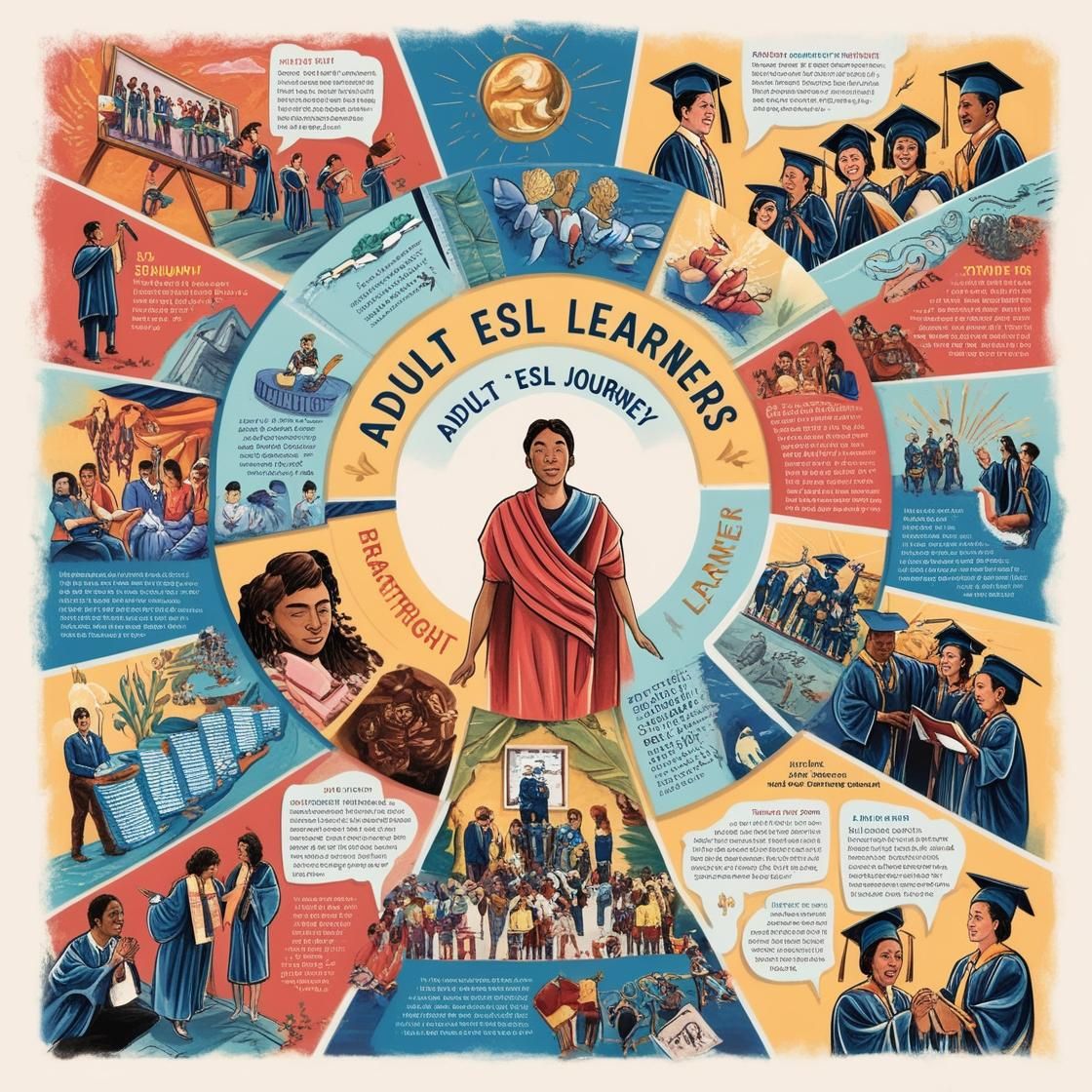Learning a new language as an adult is like setting off on an adventure filled with ups and downs. You might be motivated by work requirements, personal goals, or the desire to fit in better. Whatever your reasons, the decision to learn English is a courageous one.

Many adult learners juggle language classes with demanding jobs and family responsibilities. It’s like having multiple full-time gigs at once, but without the overtime pay or endless coffee. These commitments can turn the learning process into quite the balancing act, leaving you wondering if you’ll ever catch your breath.
Beyond the time crunch, diving into English brings personal challenges too. There’s the shy part of you that hesitates to speak up, worried about mistakes or mispronunciations. Every new word is a step forward, but the fear of saying it wrong feels like the world’s heaviest backpack.
Let’s not forget the cultural differences. Moving between your native tongue and English isn’t just about translating words. It’s about navigating different worldviews and societal norms, which can feel like learning a completely new dance routine.
For older learners or seniors, tackling English might come with a bit of skepticism from others and even self-doubt. But let’s shake that off! You bring valuable life experiences and perspectives to the table that make your language journey uniquely powerful.
The path isn’t easy, but when you choose to take that step toward learning English, you open up a world of new opportunities and connections. Remember, each stride forward, no matter how small, brings you closer to your goal. And you’re never alone on this trek.
Breakthroughs and Barriers: Common Challenges for Adult ESL Learners
Stepping into the world of English as an adult often brings with it a mixed bag of challenges and surprises. There’s the initial hurdle of understanding grammar rules that sometimes feel like trying to solve a never-ending puzzle.

Life is busy enough without adding verb conjugations to the mix. Juggling work obligations alongside family dynamics means squeezing language lessons into a calendar that’s already pretty tight. Sometimes, it seems there’s just not enough time in the day to catch up on every lesson or exercise.
And let’s talk about confidence—many adult learners grapple with shyness, making it tough to start conversations in English. It’s usual to clam up when you’re not sure whether you’ve got the sentence structure right or if you’re using the correct vocabulary. But remember, every wrong word is a step closer to getting it right the next time.
Cultural differences can also make communication a bit tricky. When traditions and social norms from your culture clash with those in English-speaking environments, it takes time to adapt. Expressions that seem natural in your native tongue might not translate over smoothly, adding another layer of confusion.
For senior learners, there’s often an extra dose of resilience needed. The journey might seem a bit longer, but your accumulated wisdom and determination can make the learning experience richer. While younger folks may breeze through some aspects, your dedication stands as a testament to your enduring spirit.
Despite the obstacles, breakthroughs happen when practice becomes your sidekick. Each small success, whether it’s nailing a tricky pronunciation or using new vocabulary correctly in a sentence, adds momentum to your progress. Remember, it’s all about persistence and finding the rhythm that works for you.
Solutions and Strategies: A Path Forward for Adult ESL Learners
Discovering effective ways to tackle the highs and lows of learning English is key to making headway. Start by creating a realistic study schedule that fits into your lifestyle. Bite-sized learning chunks here and there can do wonders without feeling overwhelming.

Immersing yourself in English can be an adventure in itself. Watch movies, listen to music, or read books in English. It’s like soaking up vocabulary and expressions without even realizing it. If you enjoy cooking, maybe try following recipes in English—it’s a fun and tasty way to learn.
Consistency is your best friend in this journey. Even just a few minutes a day can make a difference over time. Start with simple tasks, like labeling household items with their English names or practicing words aloud during daily routines.
Leverage technology to your advantage. There are language apps, online courses, and interactive platforms designed just for you. These resources often feature bite-sized lessons that fit into a busy adult’s lifestyle. Plus, learning online can connect you with a community of learners for support and motivation.
Your learning environment matters too. Surround yourself with people who encourage you to practice English. Find language exchange buddies, join local clubs, or visit cultural events where you can put your skills to use. Remember, practice doesn’t make perfect, but it sure makes progress.
With the right strategies, learning English can become less about overcoming obstacles and more about building bridges to new experiences and friendships.
Changing Perspectives: Bridging the Gap in Understanding
Educating native speakers on the real challenges faced by ESL learners can pave the way for better communication and empathy. Understanding the courage it takes to learn and communicate in a new language can go a long way in bridging cultural divides.

Biases often cloud judgment, especially misconceptions around non-English speakers. Reminding ourselves that language learning is a valuable endeavor, not a marker of intelligence or ability, can help dismantle harmful stereotypes.
Every non-native speaker carries a treasure trove of cultural experiences and insights that enrich the community. Moving beyond language barriers can lead to more inclusive environments where everyone’s story is valued.
Sharing experiences—whether through guest talks, community events, or social media—can create platforms for ESL learners to be heard and appreciated. Real stories highlight what textbooks often miss: the human aspects of language learning.
Promoting a culture of kindness and understanding plays a pivotal role in easing the ESL learning curve. Encourage dialogue, not just about language, but about the shared human experiences that go beyond words.
Empathy begins with listening, and when English speakers take the time to hear ESL learners without prejudice or impatience, real connections form. This learning is mutual and enhances both cultural awareness and emotional intelligence.
Through collective efforts to promote understanding and acceptance, communities grow stronger. Learning English then becomes more than a personal journey; it’s a step toward creating a society where diversity isn’t just welcomed—it’s celebrated.
Celebrating Progress: Encouragement for Adult ESL Learners
Stepping back to see how far you’ve come in learning English is an awesome way to fuel your motivation. Every new word you master or conversation you hold is a testament to your hard work and persistence.

Success stories of fellow learners can be incredibly inspiring. Hearing how others have overcome hurdles and achieved their language goals reminds us that progress is possible, no matter where you start.
Even small victories deserve celebration. Maybe you were able to order food in English without a hitch, or you understood a full sentence in a movie. These milestones, while they might seem tiny, are actually huge leaps on your learning path.
Encouragement is a powerful tool. Share your experiences and achievements with your peers. Not only does it boost your confidence, but it also uplifts others who might be facing similar challenges.
By embracing each step forward, you contribute to a vibrant community that values learning and cultural exchange. Remember, the journey is just as important as the destination.
With each word and sentence you conquer, you’re not just learning a language—you’re building bridges to new opportunities, friendships, and adventures. Keep pushing forward, and the progress will follow.
Leave comments and questions in the space below.


I really enjoyed reading this! What a helpful article! Learning English as an adult can feel challenging, but the tips you shared make it seem so much more achievable. I love how you emphasize practical strategies like using everyday conversations and listening to real-world English, it’s such an effective approach. Thanks for breaking it down so clearly and providing encouragement for adult learners. This is such a valuable resource!
Hi Randi, thanks for your comments. As I see it, the key to learning most anything, especially a language, is to make it as personal and real-life as possible to the learner.
KBob